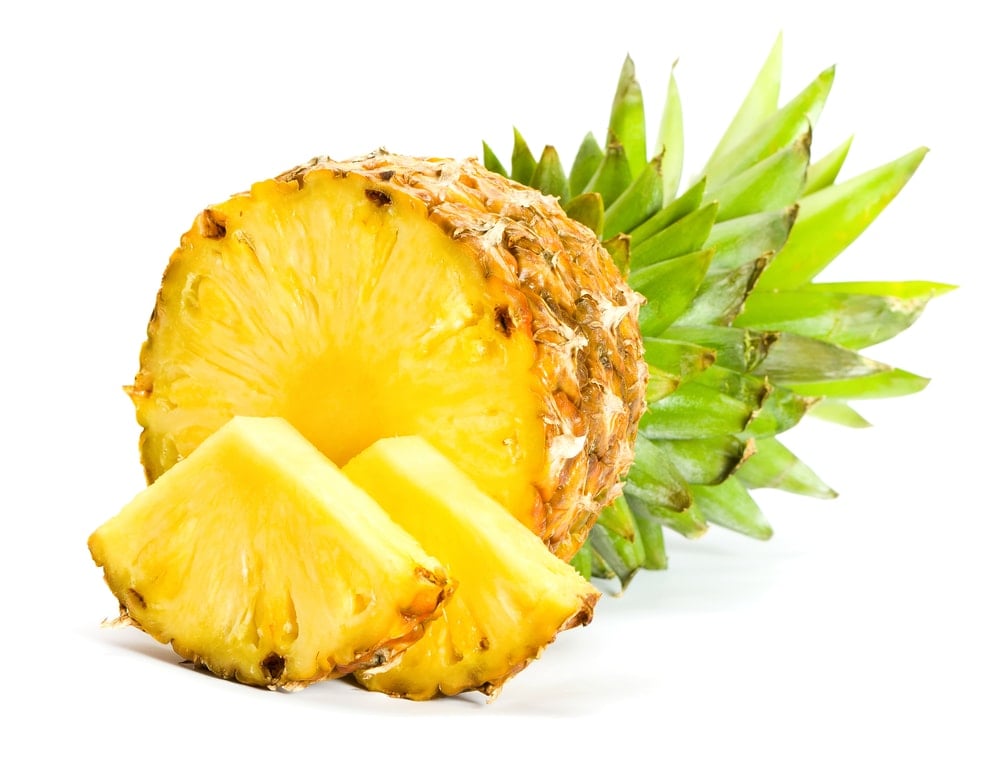What Is Bromelain Exactly And How Does It Help With My Gout?
Pineapple, native to South America can grow up to 12 inches long and weigh up to 10 pounds. It is a fruit that is enjoyed for its’ juiciness but also has a reputation as an herbal medicine and that is what we gout sufferers are interested in here. The pineapple has a sturdy stem and it contains bromelain which is an enzyme or better yet a mix of a number of different protein digesting enzymes. Pineapple is the only fruit that contains natural bromelain and you must always eat it fresh since cooking it causes it to reduce the amount of bromelain. Pineapple is also loaded with vitamin C, a strong antioxidant.
Discovered in 1957 by Ralph Heinicke, who worked as a chemist for the Dole Pineapple Company, first noticed high levels of bromelain in pineapple stems, Dole then encouraged Heinicke to find medicinal uses for the enzyme. What he found was that bromelain is a natural blood thinner and anti-inflammatory; it promotes blood circulation in your body by blocking the production of compounds that can cause swelling and pain. Thus, when inflammation is reduced, blood can move more easily to a traumatized area by relieving the pain and accelerating the healing. Bromelain may help decrease bruising, swelling, tenderness, redness, sprains that were caused by from muscle aches and pains or from tissue injuries like healing after a surgery.
Eating fruits is excellent for treating gout
Many of the treatments designed to reduce the risk of gout attacks involve maintaining a gout-friendly diet. These diets tend to include carbohydrates, dairy, vegetables, and, of course, fruits.
Fruits are an abundant source of essential vitamins, minerals, and fiber. A fruit-rich diet provides a variety of health benefits such as lowering the risk of heart disease, cancer, diabetes, and inflammation.
If you suffer from gout, your excess uric acid can raise your risk of developing many of these conditions. It’s no surprise then, that doctors regularly recommend consuming a substantial amount of fruits.
The anti-inflammatory benefits of eating pineapple
Of particular interest to those of us who suffer from gout are the anti-inflammatory effects of eating fruits. As someone familiar with gout, you may be aware that purines are a factor that contributes to the inflammation of our joints.
But just how this happens is still unclear to many people. Let’s take a look under the hood.
Purines and uric acid
Purines are a type of chemical that is naturally found in our bodies and in many of the foods we consume. Naturally, some foods contain a higher concentration of purines than others.
The usual suspects for foods with a high purine content include red meat, anchovies, sardines, dried beans, mushrooms, and alcohol, especially beer.
According to the National Center for Biotechnology Information (NCBI), 1 in 4 Canadian adults suffer from obesity. In other words, Canadians tend to overindulge in foods. But the rise in obesity is a growing problem in developed countries around the world too.
Uric acid
When the body breaks down these purine chemicals you get the arch-enemy of gout sufferers: uric acid. Uric acid is essentially a waste product that is created as a result of purines broken down by the body.
Normally, most of the uric acid dissolves in the blood, gets metabolized in the kidneys, and then exited from the body via urine. However, when we go overboard with our consumption of purine-rich foods, our kidneys can’t metabolize the purines efficiently.
As a result, uric acid keeps building up to the point where the kidneys aren’t able to eliminate it fast enough. This is a condition known as hyperuricemia and can eventually lead to the formation of uric crystals.
Urate Crystals
Urate crystals resemble needles or toothpicks and can cause tissue damage and scarring as they pass through the kidneys. They can also break into pieces and settle in the joint areas which can then trigger gout flares.
Over time, urate crystals can lead to kidney disease and even failure. This is why it’s so important to start proper gout treatments as soon as possible.
The healing properties of pineapple fruit
Pineapple is a very popular fruit for its delicious flavor, versatility, and healing properties. Whether you eat the fruit fresh, blend it in a juice or cocktail, or drink it in an herbal tea its unique taste makes this a must-have in many households.
Pineapple is rich in essential nutrients like manganese, copper, and Vitamin C. Medical studies have shown a significant correlation between consuming lots of Vitamin C and lower serum uric acid levels.
When you consider the fact that a single cup of pineapple slices contains about 79 mg of Vitamin C satisfies 88% and 100% of a man’s and woman’s daily allowance (respectively), pineapple makes a crucial fruit to include in your gout diet.
While a diet rich in Vitamin C is a crucial component of your gout-friendly diet, the star ingredient we’ll look at next is bromelain. Although pineapples are the only fruit that contain bromelain in their natural form, you can’t just eat the fruit to benefit from its gout healing properties.
Let’s take a closer look at how bromelain may help you fight gout.
What is Bromelain
Bromelain can be extracted from the stem, fruit, and juice of pineapple plants. It’s been used in folkloric medicinal treatments for hundreds of years throughout Central and South America.
Oral ingestion of bromelain orally has been shown to be effective as an anti-inflammatory. It works great at reducing muscle-related symptoms like bruising, swelling from an injury, and muscle soreness.
In addition, bromelain provides excellent relief of deeper symptoms like arthritis pain, gout, and carpal tunnel syndrome.
And as if that wasn’t enough, bromelain can even be used to reduce symptoms of hay fever, sinusitis, ulcerative colitis, and more.
As you can see, bromelain offers many benefits to help treat many everyday ailments that affect us.
What is the evidence that pineapple and bromelain is a natural pain killer for so many ailments including gout?
As for treating gout, Heinicke and other studies have found that bromelain may be useful in relieving strain-induced gout, when uric acid crystals accumulate in a joint that becomes inflamed by a strain or even normal use. Bromelain may cause the uric acid crystals to decompose thus relieving you from the pain associated with gout. Unlike pineapple stems, pineapple fruit does not contain enough bromelain enzyme to provide any provable medicinal effects.
If taken regularly, bromelain may also help prevent repeated gout attacks. Although there aren’t many studies examining the effects of bromelain on gout patients, a 2001 study published in “Cancer Chemotherapy and Pharmacology” notes that bromelain may decrease production of transforming growth factor-beta, the over- production of which is associated with arthritic-like conditions. In another 2002 study published in “Phytomedicine” also stated that bromelain may help reduce the physical symptoms of arthritic conditions.
A 1995 study conducted in Germany followed 59 people with torn ligaments and strains; and were given bromelain for three weeks. What the study concluded was the bromelain consumption caused a substantial reduction in swelling, pain and tenderness both during rest and during movement. You could basically compare the results to those people taking NSAIDs. Bromelain does this by helping excess fluid drain from the area of the muscle injury having a strong anti-inflammatory effect on the muscles. It may also help alleviate back pain and joint pain linked to arthritis.
Bromelain may even relieve carpal tunnel syndrome, ease chronic bronchitis, sinusitis and other respiratory allergies. It may help lessen the symptoms of eczema, may help reduce the swelling of cuts and scrapes even insect bites and stings! It may aid digestion and may reduce your heartburn even urinary tract infections! Furthermore, it is also being studied as a possible cancer treatment for tumors. There you have it! Bromelain is a natural pain killer for so many ailments.
How do I take bromelain?
During a gout attack, take 500mg of bromelain capsules every three hours until the attack subsides. For gout attack prevention, take 500mg twice a day between meals, on an empty stomach and add 500mg of quercentin twice daily. Quercentin is a flavonoid that reduces high uric acid levels that causes the inflammation and pain during a gout attack.
Bromelain assists in increasing your body’s absorption and utilization of quercetin, working very well together. You can take bromelain in the form of a tablet, powder or capsule found on Amazon!This is only a guideline and your doctor will be able to advise you on how much to take. Did you know that bromelain is also one of the key ingredients inside my proprietary blend which sells as a dietary supplement on Amazon called NutriGout?
If you are allergic to pineapple/bromelain do not take it. Some people have reported other side effects that include nausea, diarrhea and vomiting. Please don’t be a glutton and eat tons of pineapple as a means of obtaining bromelain because it may cause your mouth and cheeks to swell, although bromelain is considered safe even at high doses. There you have it, bromelain is an excellent natural remedy in your battle with gout, I love pineapple and usually buy one every week.
A word of caution on bromelain
As with any new treatment or medication, your first order of business should be to talk to your doctor before trying anything new. In the world of medicine, what works for one person may not work for another. And bromelain is no exception.
For all the health benefits that it provides, taking high doses of bromelain can cause mild side effects on some people. Some of these secondary effects include nausea, vomiting, and diarrhea. For women, bromelain has been linked with heavier menstrual bleeding.
If you’re already taking blood thinners such as Warfarin and Pradaxa, you should definitely avoid using bromelain. This is due to the antiplatelet effect that bromelain may have on the blood which could potentially lead to excessive bleeding.
In addition, bromelain should be avoided before and after any surgical procedures.
For those people who are allergic to pineapples, bromelain should be avoided. Your doctor will need to prescribe alternative treatments.
Having a good line of communication with your doctor is essential to ensuring that you are getting the best treatment for your particular situation. In addition to working with a doctor you can trust, you should also be a good patient by asking as many questions as you can.
This includes getting detailed tips on how to adjust your lifestyle, what medications to take, home remedies, and surgery options if applicable. Ask questions about bromelain for you and get the answers you need to help keep your gout symptoms under control.

